Sports Psychologist Role: Understanding Key Functions & Impact
Updated On: August 23, 2025 by Aaron Connolly
Core Responsibilities of a Sports Psychologist
Sports psychologists team up with athletes to strengthen their mental game and boost overall wellbeing. They focus on improving performance with psychological techniques, supporting mental health, creating custom training plans, and teaching coping skills.
Enhancing Athletic Performance
Mental performance is really the backbone of what we do. We help athletes sharpen their focus and concentration, which can make or break their results.
About 44% of athletes face anxiety before competitions. We jump in with techniques like visualisation and cognitive restructuring to tackle this head-on.
Visualisation training can actually bump up performance metrics by as much as 25%. Athletes practice running through their movements and strategies in their minds before they step into the arena.
Key performance techniques include:
- Goal-setting programmes that lift motivation by 20%
- Concentration training for those high-pressure moments
- Confidence-building drills
- Pre-competition routines
We often see talented athletes struggle to stay consistent. It’s tough to maintain your best form every time you compete.
We introduce mental frameworks so athletes can perform well, no matter what’s happening around them.
Providing Mental Health Support
Mental health support is a huge part of our job now. Nearly 30% of athletes have to deal with anxiety or depression symptoms at some stage.
Elite athletes run into unique pressures. Burnout hits about 70% of them at some point in their careers.
We create a safe space where athletes can talk about fears and emotional struggles. Our counselling covers both performance and personal issues.
Common mental health areas we cover:
- Anxiety and stress management around competition
- Psychology for injury recovery and rehab
- Support during career transitions
- Body image and eating concerns
We keep an eye on athletes and step in quickly if we spot warning signs. Early support stops bigger mental health problems down the road.
Building a strong therapeutic relationship helps athletes grow emotional resilience. That resilience often shows up as better performance on the field.
Developing Personalised Mental Training
Mental training needs to be tailored for each athlete. Everyone brings their own strengths and challenges to the table.
We do detailed assessments to spot mental skills gaps. This includes looking at how athletes currently cope and prepare mentally.
Personalised training elements include:
- Self-talk modification
- Relaxation and breathing strategies
- Attention control drills
- Mental rehearsal routines
Training schedules have to fit around physical practice and competitions. We work with coaches to weave psychological skills into the daily routine.
We keep tabs on progress to make sure techniques actually work. Athletes learn to check in with themselves and tweak their approach as needed.
The best programmes mix different strategies. For example, an anxious athlete might use breathing, positive self-talk, and visualisation together.
Teaching Psychological Interventions
Psychological interventions give athletes practical tools for tough situations. We teach techniques backed by research that athletes can use on their own.
Stress management training can lower anxiety by up to 30%. We show athletes how to spot early warning signs and act fast with coping skills.
Core interventions we teach:
- Mindfulness and staying in the present
- Cognitive behavioural tools for negative thinking
- Arousal regulation methods
- Focus and attention drills
Team-based interventions help with group dynamics and communication. Teams that work well together perform about 15% better thanks to improved trust.
We also teach athletes about the psychology of peak performance. When athletes understand their minds, they take charge of their mental prep.
Practice is key. We run regular sessions so these skills become second nature, just like physical moves.
Key Psychological Strategies
Sports psychologists use three main techniques to help athletes level up. Mental rehearsal lets players practice in their minds, positive self-talk builds confidence, and smart goal setting maps out the path to success.
Visualisation and Mental Rehearsal
Mental rehearsal is honestly one of the most powerful tools in our kit. We guide athletes in creating vivid mental images of success before they compete.
Athletes close their eyes and picture themselves nailing every move. They hear the crowd, feel their gear, and even imagine the thrill of winning. This kind of mental practice fires up the same brain pathways as real-life action.
Research shows mental rehearsal can boost performance by up to 25%. The brain can’t always tell the difference between real and imagined experiences.
We suggest athletes spend 10-15 minutes a day on mental rehearsal. They should visualise:
- Perfect technique
- Handling pressure
- Bouncing back from mistakes
- Celebrating a win
The trick is to make these mental pictures as detailed as possible. Athletes who pair this with physical training usually see better results.
Self-Talk Techniques
Self-talk is that running commentary athletes have in their heads. We teach them to steer this inner voice so it works for them, not against them.
Negative self-talk can wreck performance in seconds. Thoughts like “I always mess up” or “I’m going to lose” just add stress. Positive self-talk flips the script—it boosts confidence and keeps athletes steady when things get tense.
We spot three main types of helpful self-talk:
| Type | Purpose | Examples |
|---|---|---|
| Motivational | Build confidence | “I’ve trained for this”, “I am strong” |
| Instructional | Stay on technique | “Keep your eye on the ball”, “Breathe deeply” |
| Emotional | Keep calm | “Relax and focus”, “One point at a time” |
We help athletes notice their negative patterns and swap them out for positive, believable phrases.
The best self-talk is short, present-tense, and fits the sport. Changing old habits takes time, but with practice, it sticks.
Goal Setting for Success
Setting the right goals gives athletes direction and drive. We use structured methods to help athletes set goals that actually push performance.
The best goals follow the SMART system: Specific, Measurable, Achievable, Relevant, and Time-bound. Vague goals like “get better” don’t cut it because they’re impossible to track.
We focus on three types of goals:
Outcome goals are about the end result (like winning a championship). These are motivating, but not fully in the athlete’s control.
Performance goals aim for personal bests (like running a certain time). Athletes have more say over these.
Process goals zero in on technique and prep (like practicing free throws daily). Athletes can totally control these and they build confidence.
We usually recommend 70% process goals, 20% performance goals, and 10% outcome goals. This keeps athletes focused on what they can actually do, while still reaching for big achievements.
Writing goals down and checking them weekly keeps motivation strong and progress clear.
Supporting Mental Health and Wellbeing
Sports psychologists help athletes manage anxiety and stress, and build long-term mental resilience. We teach practical relaxation techniques and create custom strategies to keep mental wellness on track throughout an athlete’s career.
Addressing Anxiety and Stress
We work one-on-one with athletes to spot their anxiety triggers. Competition nerves, fear of failure, and performance pressure come up a lot.
Cognitive restructuring helps athletes challenge those negative thoughts. We show them how to swap “I’ll embarrass myself” for “I’m prepared and capable.”
We use exposure therapy to tackle competition anxiety. Athletes face tough situations step by step—maybe practising penalty kicks with a crowd watching.
Breathing techniques offer quick relief in stressful moments. The 4-7-8 method (inhale for 4, hold for 7, exhale for 8) calms the body fast.
We also help athletes figure out which anxiety is helpful and which isn’t. Sometimes a little nervousness actually sharpens focus.
| Anxiety Type | Symptoms | Our Approach |
|---|---|---|
| Performance anxiety | Rapid heartbeat, sweating | Gradual exposure, breathing exercises |
| Social anxiety | Fear of judgment | Confidence building, cognitive work |
| Injury anxiety | Fear of re-injury | Trust rebuilding, controlled movement |
Promoting Relaxation Techniques
We teach athletes progressive muscle relaxation to let go of tension. They tense and relax muscles in a set order.
Mindfulness meditation keeps athletes present during competitions. We start with short sessions—just five minutes—and build up from there.
Visualisation helps athletes mentally rehearse success. They picture themselves executing perfectly, down to the smallest detail.
Breathing exercises are the base for most relaxation methods. Diaphragmatic breathing switches on the body’s natural calm response.
Music therapy works for lots of athletes. We help them put together pre-competition playlists for relaxation and focus.
Quick relaxation tricks include:
- 30-second breathing resets
- Muscle tension release
- Positive self-talk
- Grounding exercises (like the 5-4-3-2-1 sensory method)
Building Resilience
We help athletes build mental toughness through controlled challenges. This boosts their confidence when setbacks or pressure hit.
Stress inoculation training exposes athletes to manageable stress so they can practice coping before big competitions.
We encourage a growth mindset. Athletes start to see failures as chances to learn, not signs of weakness.
Support networks matter too. We connect athletes with teammates, coaches, and family so they have people to lean on.
We plan out recovery to prevent burnout and keep mental wellness strong. Structured rest and new activities make a big difference.
Goal-setting keeps motivation alive through ups and downs. We teach athletes to set process goals, not just outcome ones.
Resilience-building activities include:
- Journaling to process emotions
- Stress exposure practice
- Problem-solving skills
- Communication training with support teams
Collaboration and Working Relationships
Sports psychologists build strong partnerships with coaches, families, and teams to support athletes. Trust and clear communication are the foundation for these relationships at every level.
Working with Coaches
We work side-by-side with coaches to connect mental training with physical prep. This means keeping in touch about athlete progress and training goals.
Coaches often act as the main go-between for us and the athletes. We share mental performance insights but always respect the coach’s lead on training.
Key collaboration areas:
- Pre-competition mental prep routines
- Managing training stress and motivation
- Spotting athletes who need extra support
- Building team culture and communication
Pro athletes usually have more structured coaching relationships. Amateur athletes might work with volunteer coaches who need extra help with mental performance topics.
We try to attend training and competitions when we can. This helps us see team dynamics and catch issues early.
Supporting Athletes’ Families
Family support can make or break an athlete’s journey, especially for younger players. We help families see their role in mental development.
Parents sometimes feel their own competition nerves. We teach them how to support without adding pressure.
Common family support topics:
- Managing expectations and goals
- Understanding competition schedules
- Supporting practice at home
- Spotting burnout or overtraining
We hold family meetings to go over the athlete’s progress. These chats keep everyone on the same page.
Families of amateur athletes are usually more involved in daily training. Pro athletes may need help setting boundaries with their families.
Team Integration
We jump in and become part of the extended team support network. That means working side by side with medical staff, nutritionists, and other specialists.
Team building activities let us get a feel for group dynamics. We watch how athletes talk, interact, and solve problems together.
Our integration usually looks like:
- Showing up at team meetings and training camps
- Working directly with physiotherapists on injury recovery
- Backing up coaching staff during tough stretches
- Helping team members communicate better
We keep things confidential but still share insights that matter to the team. It’s a tricky balance, so we set clear ground rules about what gets shared.
We check in regularly with team staff to make sure everyone’s on the same page. Our methods shift to fit the team’s culture and daily routines.
Role in Team and Group Dynamics
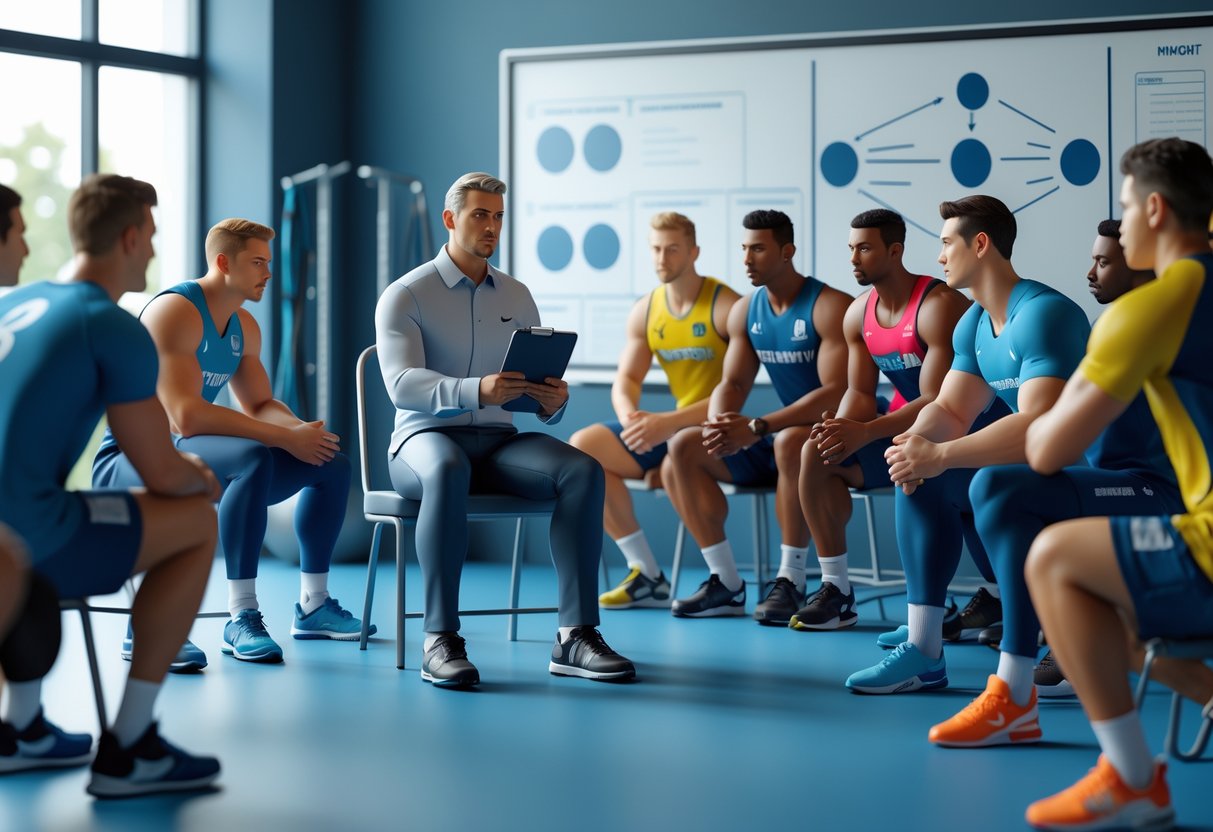
Sports psychologists shape how teams work and communicate. We help players connect, and we step in when conflicts threaten performance.
Improving Communication
Clear communication makes or breaks a team. We coach athletes to listen better and give feedback in ways that actually help.
During high-pressure moments, mixed messages pop up all the time. So, we bring in communication protocols for different situations.
Maybe we set up hand signals for noisy arenas. Or we encourage players to use “I” statements, not blame.
Quick win: Teams that drill structured communication notice fast improvements in coordination.
Warning: Bad communication habits spread quickly and become tough to break.
We push for regular team meetings to keep conversations open. Players get a chance to bring up issues before they turn into real problems.
Fostering Cohesion
Team cohesion isn’t just about getting along. It’s about building shared goals and real trust.
We run team building exercises that zero in on trust and cooperation. These help players see each other’s strengths and weaknesses.
Research says cohesive teams perform about 15% better than divided ones. That’s mostly thanks to better communication and deeper trust.
We encourage teams to develop their own rituals and traditions. Pre-game routines and unique celebrations create shared memories.
Common results:
- Players back each other up after mistakes
- Decision-making gets sharper under pressure
- Motivation to train goes up
Even individual sports teams benefit from cohesion work, even if athletes compete solo.
Conflict Resolution
Every team has disagreements. We teach players and coaches to handle conflicts before they spiral.
Most teams dodge tough talks, which only makes things worse. We create safe spaces so everyone can air frustrations without fear.
Our mediation techniques help both sides find common ground. We listen, then point out shared team goals.
Key strategies:
- Set team rules for respectful disagreement
- Teach players to separate personal feelings from team objectives
- Help coaches set the example for conflict resolution
We’d rather help teams spot problems early than fix big blowups later.
When roles or playing time spark conflict, we remind everyone how each person matters to the team’s success.
Preparation for Competition
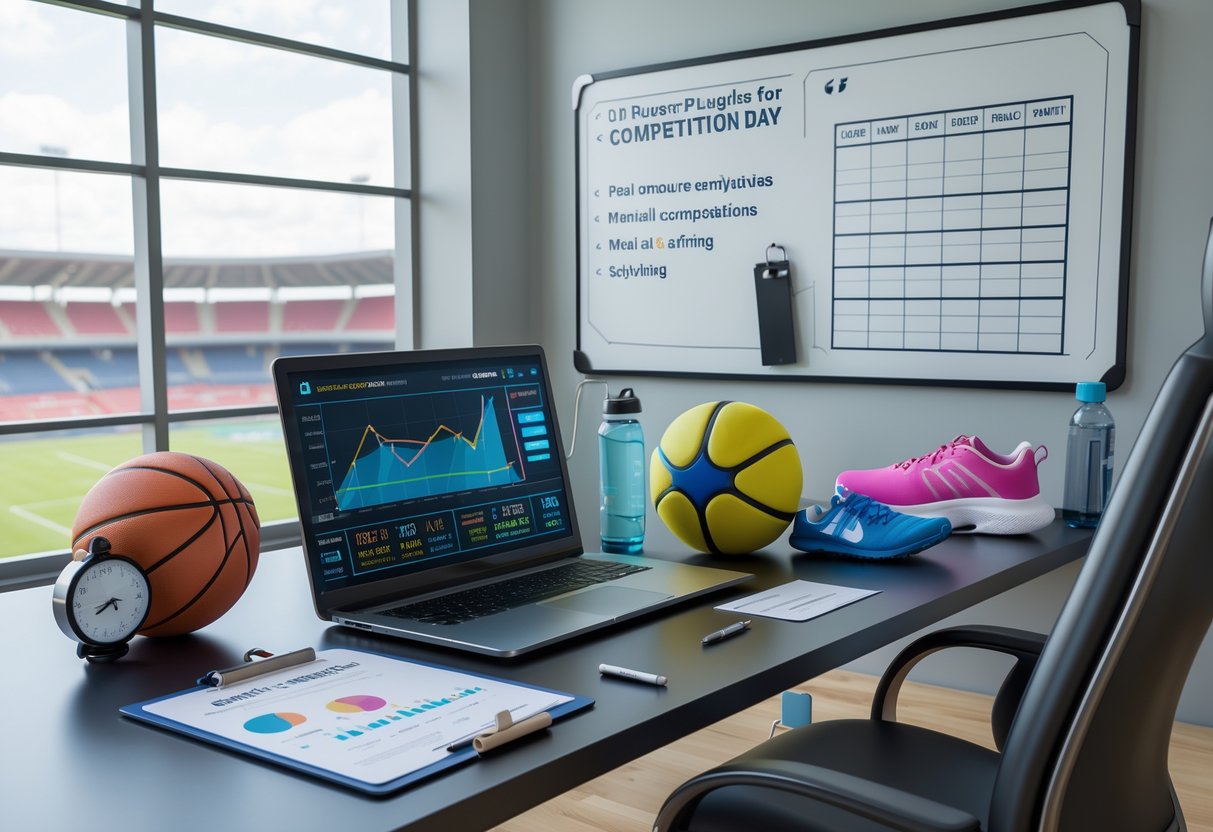
Sports psychologists get athletes mentally set before big matches and tournaments. We check on their mindset and teach skills to handle pressure.
Mental Readiness Assessment
First, we figure out where an athlete’s head is at before competition. We look at their focus, confidence, and any worries they have.
Most of us use simple check-ins or chats to spot issues. We might ask about sleep, eating, or how they’re feeling about the next match. Around 44% of athletes say they feel anxious before competing.
Key things we check:
- Focus during practice
- Self-belief
- Stress about performing
- Mental rehearsal habits
We also ask how well they can visualize success. Mental rehearsal is a game-changer. Athletes who visualize routines often perform 25% better than those who don’t.
This assessment shapes a custom plan for each athlete. Some need a confidence boost. Others need help staying calm under pressure.
Performance Under Pressure
Once we know what an athlete needs, we teach ways to handle tough moments in competition. High-pressure situations can make or break a game.
Pressure management tools:
- Deep breathing
- Positive self-talk
- Quick focus resets
- Stress-busting routines
We practice these skills during training. That way, athletes can use them when it really counts. Many pros have their own phrases or pre-game actions for big moments.
Mental rehearsal matters here, too. We help athletes picture themselves staying calm when the crowd’s loud or the score’s tight. Practicing for pressure makes the real thing less scary.
The goal is simple: trust your training, even when things get intense. Good prep lets athletes focus on playing, not on worrying about the outcome.
Injury Recovery and Return to Play
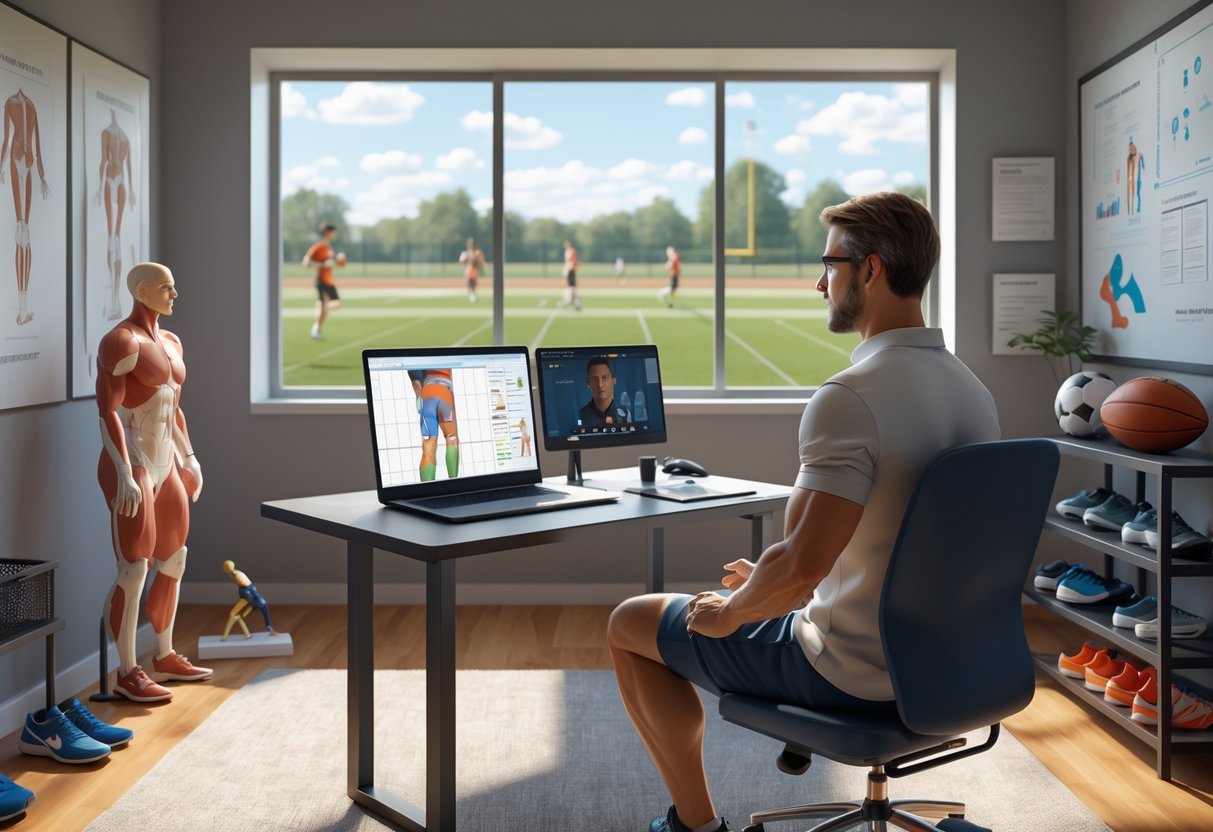
Injuries can be brutal for esports athletes. We help players rebuild mental resilience and deal with the ups and downs of recovery.
Coping with Setbacks
Esports injuries often sneak up on players. Unlike in traditional sports, gaming injuries like wrist pain or back problems can take months to heal.
The mental impact can be rough. Many players go through shock and denial at first. They worry about losing their edge or missing out on tournaments.
We work with injured players to build healthy coping strategies. This helps them process tough emotions without slipping into bad habits.
Big psychological challenges:
- Fear of permanent injury
- Frustration with slow recovery
- Anxiety about being replaced
- Feeling isolated or down
Support helps players see recovery as part of their journey, not the end of it. Mental health support becomes essential during long rehab stretches.
Players pick up tools like mindfulness and cognitive restructuring. These help them stay positive—even when progress crawls.
Motivation During Rehabilitation
Staying motivated during rehab is a different challenge. Physical therapy and ergonomic tweaks aren’t as thrilling as tournament prep.
We help players set realistic, short-term recovery goals. For example, aiming for 30 minutes of pain-free typing before thinking about marathon practice sessions.
Motivation strategies:
- Track daily progress
- Adjust training routines
- Stay in touch with teammates
- Study new game strategies
We focus on building resilience here. Players often come back tougher after recovery.
Some use downtime to watch gameplay footage or sharpen their strategic thinking. That keeps them engaged with the sport while healing.
Check-ins with us prevent isolation and help players stay accountable. Emotional support matters just as much as physical treatment during a comeback.
Educational Pathways and Professional Credentials
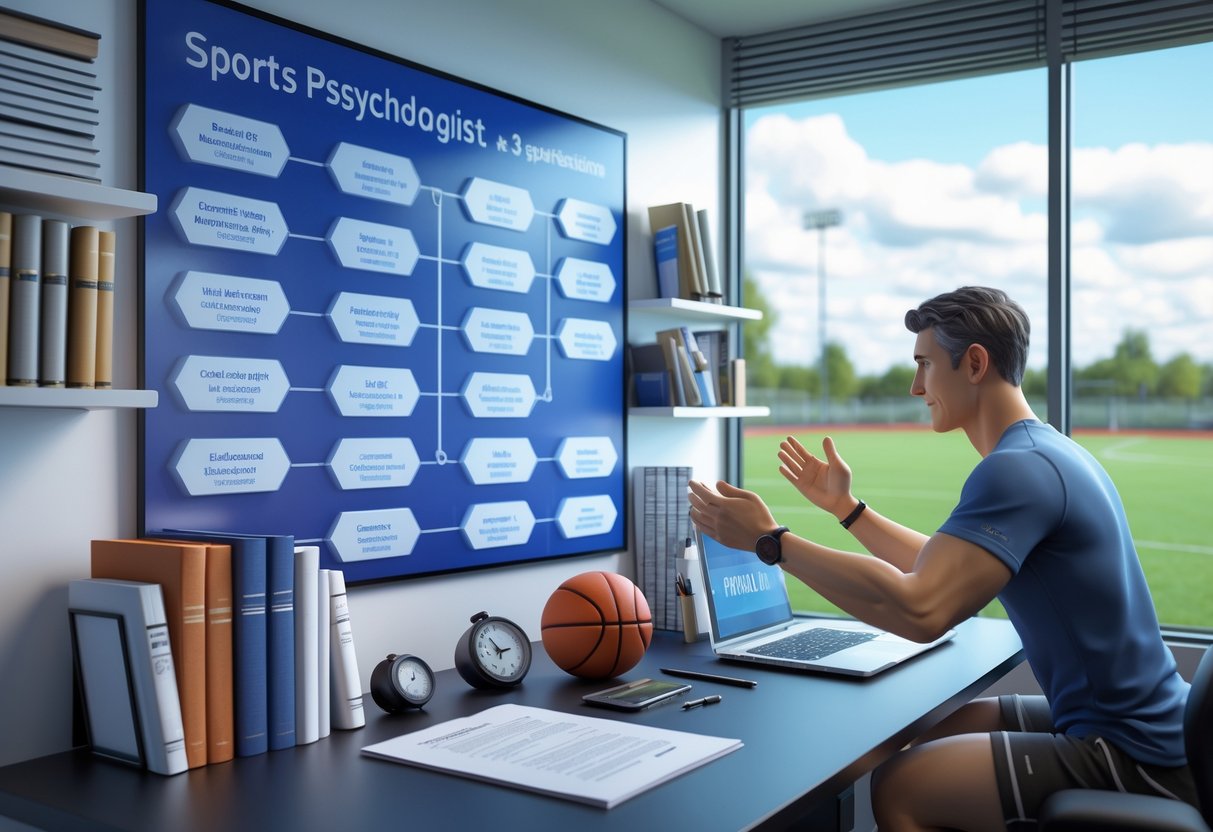
If you want to become a sports psychologist, you’ll need specific degrees and professional credentials. Most jobs require at least a master’s degree, and clinical work means getting a doctorate and a license.
Required Degrees and Training
You’ll start with a four-year bachelor’s in psychology, kinesiology, or exercise science. These days, more universities offer sports psychology options.
A master’s in sports psychology, counseling, or clinical psychology is the usual minimum for entry-level jobs. Programs last 1-3 years and cover performance, counseling, and injury psychology.
Master’s program basics:
- Performance psychology
- Sport-specific mental training
- Research and stats
- Supervised practical work
If you want to practice clinically, you’ll need a doctorate in psychology (Ph.D. or Psy.D.). Doctoral programs take 5-7 years, plus a two-year internship. The American Psychological Association recommends this for full sports psychology practice.
Most programs require hands-on fieldwork or internships. You need that real-world experience with athletes and teams.
Licensing and Certification
Your professional path depends on your role. If you want to do clinical work, you’ll need a license. If you focus on performance consulting, certification is the way.
The Association for Applied Sport Psychology gives the Certified Mental Performance Consultant (CMPC) credential. You’ll need a master’s and specific coursework.
CMPC checklist:
- Master’s in a related field
- Sports psychology coursework
- 400 supervised hours
- Submit a professional portfolio
For clinical work, you’ll need state licensure. That means a doctorate and supervision by a licensed psychologist. The Association of State and Provincial Psychology Boards handles licensing standards.
Some clinical sports psychologists get counseling licenses with a master’s in counseling or clinical psychology. That lets you provide therapy while focusing on performance.
Relevant Professional Associations
Professional associations offer education, networking, and career resources. Joining shows you care about standards and growth.
The Association for Applied Sport Psychology is the main group for practitioners. They provide certification, research, and conferences.
Key organizations:
- American Psychological Association Division 47 (Exercise and Sport Psychology)
- International Society of Sport Psychology
- North American Society for the Psychology of Sport and Physical Activity
- SHAPE America: Society of Health and Physical Educators
You’ll need continuing education to keep your membership and certifications. Members get research access, job listings, and workshops.
Many groups offer discounted student memberships, so you can start networking early.
Applications Beyond Sports

Sports psychologists bring their skills to high-stress fields like the military and business, and they help people make positive lifestyle changes through mental performance coaching.
Support for Military and High-Pressure Professionals
Military personnel face mental challenges a lot like elite athletes. We work with soldiers to build mental resilience and stress management skills for combat.
Visualization techniques help soldiers prep for high-stakes missions. The same mental routines that athletes use before games help soldiers stay sharp under pressure.
Corporate leaders and emergency responders also use sports psychology tools. CEOs adopt athlete-style goal-setting to boost their own performance.
Mental performance training helps:
- Handle stress in big moments
- Stay focused in chaos
- Build confidence for tough presentations
- Make quick decisions
These techniques work because both athletes and high-pressure pros need to perform when it counts most. Success really depends on mental clarity under stress.
Advising Lifestyle Changes
Sports psychologists help regular people change habits and mindsets for good. We’ve seen counseling psychology methods originally made for athletes work for weight loss, job changes, and personal growth.
Goal-setting strategies that build champions help people reach fitness or career goals. Visualization, once just for athletes, now helps anyone overcome fear or boost confidence.
We teach clients to:
- Break big goals into smaller steps
- Build steady routines
- Bounce back from setbacks
- Toughen up mentally for life’s challenges
A lot of people struggle with motivation and self-doubt—whether it’s fitness, relationships, or work. The mental training that shapes champions gives practical tools for everyday problems.
We focus on changing thought patterns and building resilience, not just talking through issues. This action-based approach often brings results faster than traditional therapy.
Research and Development in Sport Psychology

Sport psychology keeps evolving thanks to ongoing research and real-world testing. New studies always shape how we understand the mental side of performance.
Ongoing Scientific Advances
Sport psychology research keeps searching for smarter ways to boost athletic performance. Scientists dive into how different mental techniques actually play out in real competitions.
Studies show that 44% of athletes feel anxiety before competing. This kind of data helps sport psychologists develop better ways to handle those pre-game jitters.
Recent research backs up mental skills training. Athletes who practice visualisation often see a 25% increase in performance metrics. Researchers have tested these techniques both in labs and on the field.
Scientists dig into team dynamics too. They noticed that cohesive teams perform 15% better—probably thanks to stronger trust and communication. This kind of insight shapes how sport psychologists work with groups.
Mental health research matters more than ever. Studies reveal that 30% of athletes struggle with anxiety or depression. With this knowledge, sport psychologists can spot issues early and step in with real support.
Integrating Kinesiology and Sports Medicine
Sport psychology teams up closely with kinesiology and sports medicine to help athletes as a whole. This team approach looks at both mental and physical factors that shape performance.
Kinesiology explores how the body moves in sport. When you mix it with sport psychology, you start to see how a person’s mental state changes their movement. Stress, for example, can mess with how athletes move and compete.
Sports medicine professionals and sport psychologists join forces to help injured athletes. When athletes get mental support during recovery, they bounce back faster and feel stronger when they return.
Research teams often pull in sport psychologists, kinesiologists, and sports medicine experts. They use scientific methods to see how psychological strategies impact performance. Working together, they create evidence-based practices that actually help.
Modern training programs blend all three areas. Athletes get mental skills coaching alongside physical training and medical care. This well-rounded approach tends to get better results than focusing on just one thing.
Career Prospects and Work Environments
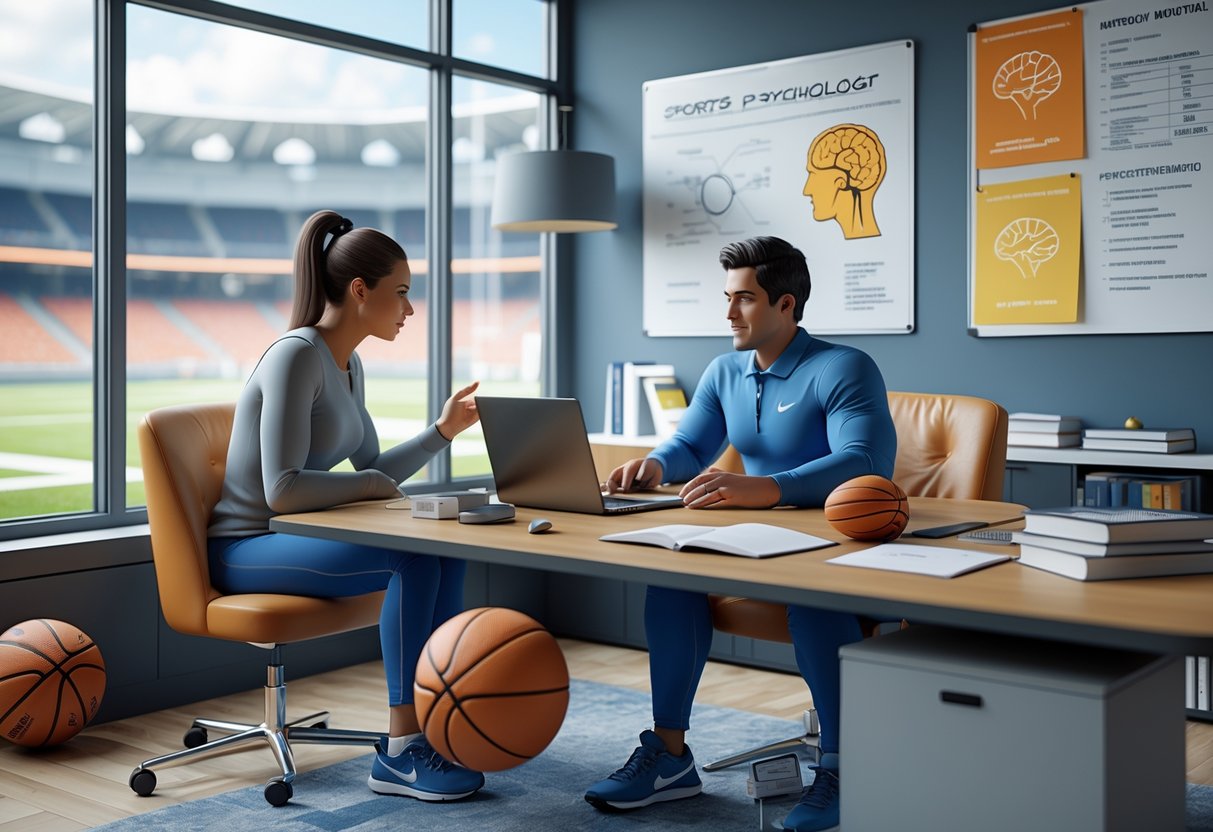
Sports psychologists can find jobs almost anywhere—professional teams, schools, clinics, you name it. The job isn’t always easy for work-life balance since athletes often need support outside regular hours, especially during competition seasons.
Typical Work Settings
Professional Sports Teams and Clubs Many sports psychologists work with pro teams. They travel with athletes to competitions and training camps. These jobs usually pay the most.
Private Practice and Clinics Some run their own offices. Athletes come in for regular sessions. This setup gives you more control over your time.
Educational Institutions Universities and schools hire sports psychologists to help student-athletes. You’ll work with young people juggling studies and sport. These jobs usually have steadier hours than team gigs.
Rehabilitation Centres Sports psychologists help injured athletes get back into the game. They team up with physiotherapists and doctors. The main goal is to help athletes overcome fears and mental blocks after injuries.
Sports Psychology Consultancy Freelancers work with several clients at once. They might support individual athletes, coaches, or small teams. You’ll need sharp business skills for this path.
Work-Life Balance in the Profession
Irregular Hours and Travel Your schedule will follow the athletes’. Expect to work evenings and weekends, especially during competitions. If you’re with a touring team, travel is part of the deal.
Seasonal Demands Workloads shift with the sports calendar. Football season? Things get hectic. Some sports slow down in summer, giving you a breather.
Emergency Support Sometimes athletes need help right after a bad performance or injury. You’ll need to be on call for these moments, which can interrupt your personal plans.
Flexibility Benefits Private practice lets you set your own hours. University jobs usually come with holidays. Some roles even allow remote sessions by video call.
Frequently Asked Questions

People ask a lot about sports psychology careers, from training requirements to job prospects. Here’s what you should know about the practical side of working in this field.
What qualifications are needed to become a sports psychologist?
First, you’ll need a psychology degree. Most people start with a bachelor’s in psychology or sports science.
Next, you’ll need a master’s in sports psychology. Some jobs want you to have a doctorate as well.
Professional registration is a must. In the UK, you’ll register with the Health and Care Professions Council.
Employers often look for extra certifications too. The British Association of Sport and Exercise Sciences offers recognised qualifications.
Could you tell me about the various work environments for sports psychologists?
Sports psychologists work in lots of places. Pro sports teams hire them full-time or as consultants.
University sports programs often bring them in to work with student athletes and research teams.
Private practice is another route. Many psychologists run their own clinics or consultancies.
Some work in rehab centres, helping injured athletes get back to competition safely.
Olympic training centres and national governing bodies also hire sports psychologists. These jobs usually mean working with elite athletes.
What might one expect to earn as a sports psychologist?
Starting salaries usually range from £25,000 to £35,000 a year. Experience and qualifications make a big difference.
Mid-career professionals earn between £40,000 and £60,000. If you’ve got a doctorate, you can earn more.
Senior sports psychologists can make £70,000 or higher. Private practice income really depends on your client list and reputation.
The top jobs pay the most. If you work with Premier League teams or Olympic athletes, you could earn six figures.
Location matters, too. London and other big cities usually offer higher pay than rural areas.
What are the benefits and drawbacks of pursuing a career in sports psychology?
The work feels rewarding. You get to help athletes reach their goals and break through mental barriers.
There’s a lot of variety. You might work with different sports and age groups all the time.
Travel can be a perk. Many jobs involve going with teams to competitions and training camps.
But the field is competitive. There are more qualified people than open jobs.
Income isn’t always steady. Freelance and consulting work can be unpredictable.
Irregular hours are common. Weekend and evening work comes with the territory during competition seasons.
How many years does it typically take to train and qualify as a sports psychologist?
A bachelor’s degree takes three or four years. Most people study psychology or sports science.
Add two more years for a master’s in sports psychology. Some programs let you go part-time, but that takes longer.
If you go for a doctorate, add another three to four years. Not every job needs this, though.
Professional registration and certification take extra time. Expect about a year for supervised practice and exams.
So, you’re looking at six to eleven years of training altogether. The timeline really depends on your path.
What’s the current job market like for sports psychologists?
Demand keeps growing. More teams and athletes actually see the value in mental training now.
Still, competition can get pretty intense. Lots of qualified folks jump at each opening.
Freelance gigs are popping up more often. Some sports psychologists carve out solid consulting careers.
The esports world brings in fresh opportunities too. Gaming organizations are starting to bring sports psychologists onto their competitive teams.
If you specialize, you’ll probably stand out more. Focusing on certain sports or groups makes you more appealing.
Networking really matters when you’re looking for work. A ton of jobs never even get posted and just go to people with the right connections.

